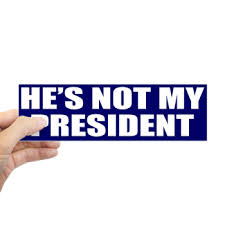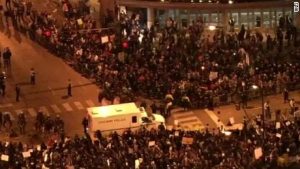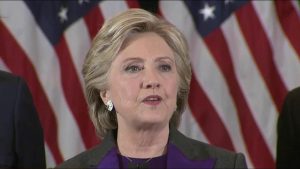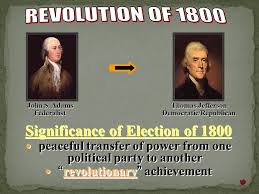Jesus spoke the truth AND confronted those who used their position to justify their lies, self-righteousness, vitriol and hate. As a Christian, I am called to do the same. A Very Wise Person
Late in 1992, in the wake of Bill Clinton’s winning the Presidency, I noticed an interesting phenomenon. Jeanne and I were living in Memphis at the time, working at a small Catholic university that was my first teaching position after graduate school. Over the weeks following the election, more and more vehicles on the road were sporting a new bumper sticker: He’s Not My President. Apparently, some Tennesseans were not happy with the election result. Eight years later, now happily working and living in southern New England, similar bumper stickers started popping up in the wake of George W. Bush’s contested victory over Al Gore: He’s Not My President. In 2008 and 2012 similar bumper stickers broke out like a rash: He’s Not My President.
Apparently, some Tennesseans were not happy with the election result. Eight years later, now happily working and living in southern New England, similar bumper stickers started popping up in the wake of George W. Bush’s contested victory over Al Gore: He’s Not My President. In 2008 and 2012 similar bumper stickers broke out like a rash: He’s Not My President.
I’ve had the opportunity over the years to raise this phenomenon to my students’ attention in various classroom contexts. “If you had a chance to talk with the person with that bumper sticker on her or his car, what would you say?” I ask. Invariably my students answer, correctly, that the person who won the election is your President, whether you like it or not. That’s one of the problems with democracy—often the person or policy that, in your estimation, makes the most sense doesn’t win. But as long as the election was run according to lawful procedures, everyone is supposed to deal with the results and move on.
And then last Tuesday happened. In the aftermath of the most stunning and shocking Presidential election result in my lifetime, and one of the most unexpected in American history, protests are not waiting for bumper stickers to get printed. Protest rallies in cities nationwide have broken out with chants of “We don’t accept the President-elect!” and “Not my President.” #NotMyPresident is trending on Twitter. My youngest son, in Denver with a couple of friends last Thursday evening, called me while I was watching a soccer game on campus. “DAD!” he yelled excitedly so I could hear him over soccer fan noise. “My friends and I are eating dinner and heard a bunch of noise in the street outside! It’s an anti-Trump rally! We’re going to finish dinner and head out to join in!” Later that evening he posted a video on his Facebook page of he and his friends doing just that.
And yet during the day on Thursday the President-elect and the sitting President sat together in the Oval Office after meeting for the first time and having what they both described as a constructive conversation, looking normal, calm and collected, and laying the groundwork for a peaceful and efficient period of transfer of power. Never mind that this President has been arguing over the past few weeks that the President-elect is thoroughly unqualified to occupy the Oval Office or handle the nuclear codes. Never mind that the President-elect rose to political attention eight years ago by questioning loudly and publicly whether the President was even born in this country. On Wednesday, the person who everyone thought would be the President-elect, the person who won more votes on Tuesday than the President-elect, in the aftermath of the nastiest and most brutal election contest in anyone’s memory,  said that everyone owed the victor their support as he attempts to figure out how to do a job that millions of people consider him to be grossly unqualified for. As philosophers like to say, we are living in a time of cognitive dissonance—on steroids.
said that everyone owed the victor their support as he attempts to figure out how to do a job that millions of people consider him to be grossly unqualified for. As philosophers like to say, we are living in a time of cognitive dissonance—on steroids.
The brutal fact for many of us, for those of us who fear that what the President-elect said and did during the campaign might be a more accurate indicator of who he really is than the remarkably human-sounding person who sat with the President on Thursday and delivered his acceptance speech in the wee hours of Wednesday, is that Donald Trump is the President-elect and will be my President—our President—starting on Inauguration Day in January. As I discussed the election with a room full of stunned students on Thursday, young adults trying to come to grips with how the first Presidential election they voted in turned out, I was reminded of something a colleague of mine in the history department once said.
My colleague is a professor-emeritus and a specialist in American Presidential history. I taught with him in an interdisciplinary program a couple of times early in my career, and I’ll never forget when he told our students during a lecture that the American Revolution did not come to a successful conclusion until the Presidential election of 1800.  Bitter rivals John Adams (the incumbent President) and Thomas Jefferson were pitted against each other, both believing that the future of the fledgling United States of America depended on his rival being defeated. The electoral college was tied, sending the contest to the House of Representatives where Jefferson was elected on the 36th ballot. For the first time, the provisions in the Constitution for the transfer of power from an outgoing to an incoming administration were put to the test. Would Adams actually turn the reins of power over to his bitter rival? According to my colleague, the American Revolution came to a successful conclusion only when the peaceful transition of power from Adams to Jefferson did indeed take place, the very transition process that both President Obama and Hillary Clinton referred to as “enshrined” in our national history and political processes.
Bitter rivals John Adams (the incumbent President) and Thomas Jefferson were pitted against each other, both believing that the future of the fledgling United States of America depended on his rival being defeated. The electoral college was tied, sending the contest to the House of Representatives where Jefferson was elected on the 36th ballot. For the first time, the provisions in the Constitution for the transfer of power from an outgoing to an incoming administration were put to the test. Would Adams actually turn the reins of power over to his bitter rival? According to my colleague, the American Revolution came to a successful conclusion only when the peaceful transition of power from Adams to Jefferson did indeed take place, the very transition process that both President Obama and Hillary Clinton referred to as “enshrined” in our national history and political processes.
After telling this story in class the other day, I reminded my students that at one point in the summer a document was made public, signed by dozens of former generals and foreign policy experts, warning that Donald Trump must not be elected President, due to his shocking lack of knowledge about even the most basic details of foreign and military policy. And yet he was elected last Tuesday. My students quickly noted that what happened last week, in another country or in another part of the world, would have opened the door to a military coup. In the interest of national security, the argument would go, this man must not be in charge of the military, foreign policy, or the nuclear code. But such a coup will not take place— respect for the rule of law and due process remains strong, even though millions of people are convinced that what happened last Tuesday was one of the worst decisions the American electorate has ever made.
respect for the rule of law and due process remains strong, even though millions of people are convinced that what happened last Tuesday was one of the worst decisions the American electorate has ever made.
Based on what he has said and done over the past many months, I find little in the President-elect to support or endorse—he does not represent me or any of my deepest interests or commitments. But he will be President for the next four years, barring unforeseen events. Already there is evidence of misogyny, xenophobia, and racism rearing their ugly heads as certain Americans feel empowered and are emboldened by the election of a man who they have taken at his word. The anti-Trump rallies are at least partially fueled by persons like myself who fear that the country we love and its most important values will be under serious attack over the next few years. And then there’s my faith—what direction might it provide for how to frame my thoughts and attitudes going forward? In a Facebook post a few days ago, my wife Jeanne provided a beautiful and promising answer.
The anti-Trump protesters are angry. Their anger has motivated them to action. Perhaps anger is a fruit of love, love that has been abused, ignored, invalidated, spat upon. Love’s voice is powerful. Love’s voice screams at injustice. Love’s voice demands that we “DO justice, love kindness and walk humbly with our God.”
I am a Christian. My Jesus was marginalized. He did not favor those who marginalized others. He spoke the truth AND confronted those who used their position to justify their lies, self-righteousness, vitriol and hate. As a Christian, I am called to do the same.
So am I. So are we all.












